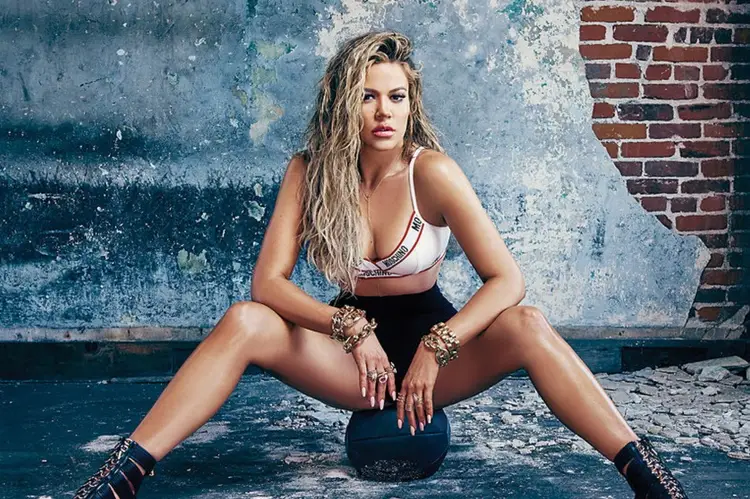The Problematic New Series from Khloé Kardashian
You don’t need a “revenge body,” you need better friends.
By Tylah Silva, Emerson College
2017 is in its early months, so most people are still sticking with their New Year’s resolution diets.
Because it’s still resolution season, a slew of gym, diet pill and diet plan commercials are bombarding the television, so much so that it’s hard not to see them. However, the most worrisome of the season has to be Khloé Kardashian’s new show, “Revenge Body with Khloe Kardashian,” and believe me, diet pills are pretty problematic, so that’s saying something.
The premise of the show is pretty self-explanatory; people diet and exercise to achieve the “perfect” body type in order to gain revenge over the person or peoples who wronged them.
In the first episode, two participants, an eighteen-year-old girl named Stephanie and an older man named Will, both express depression and utter self-hatred over their bodies and overall look.
Stephanie isn’t fat, but she sees herself that way. She has acne problems, and a brief clip in the show reveals that her friends, all of whom are skinny, talk her out of outfits that show off her silhouette. Later she reveals that in fact she wants revenge on her former best friend, Miranda, who would always put down her body. It sounds more like Stephanie needs better friends than she does a “revenge body.”
Will has similar insecurities, but instead of a former ex-friend, he wants revenge on his ex-boyfriend Kyle, who dumped Will because he fell out of love when Will gained weight. It’s important to note that Will is also not very fat. At the end of the episode, Stephanie loses twenty-five pounds while Will loses thirty. Not a huge difference.
But, these stories reveal more about the culture around beauty than they do about the people themselves. Both Stephanie and Will can pinpoint the origin of their insecurities to people who disparage their bodies. Their own self-hatred doesn’t start from within, but from others. Neither Stephanie nor Will complain about health problems or about feeling sluggish, both of which are ailments associated with obesity. In the end, it’s not Stephanie and Will who should change, but society. In a world without fatphobia, overweight people would never be forced to feel ashamed of their bodies.
Kardashian, who hosts the show and is probably in the episode for a minute-and-a-half, reveals much about her own insecurities and history with fatphobia. At the beginning of the episode, the newly-thin Kardashian discloses that she was always the fattest sister, though given the public nature of the Kardashian clan, her revelation is hardly news to fans.
Viewers of “Keeping Up with the Kardashians” saw Kardashian struggle with her appearance. A number of memes and online posts also don’t hold back in portraying her as unattractive and often masculine (not that that’s a bad thing). Anyone can see how growing up with that type of scrutiny can be hard, especially when people compare you to your skinnier sisters.
Her self-doubt is what also makes her relatable and the perfect person to host such a show. Kardashian mentions multiple times how she always felt insecure next to her “prettier” sisters, and reveled whenever they felt as ugly as she did. Kardashian is just like the people she “helps” on her show—just another victim of unrealistic, Eurocentric beauty standards that perpetuate fatphobia.
The difference between Kardashian and her participants, however, is that she now plays a major role in preserving that fatphobia in a highly destructive manner. She’s created yet another platform in which prejudice against fat people can be spread. This time though, the premise eschews even pretending that the weight loss is for the participant’s health (a number of articles will tell you that isn’t even true).
Rather, the entire basis of the show is to change their bodies for purely aesthetic reasons, meaning that their lifestyle changes aren’t even for Stephanie and Will; they’re for the people who wronged them.
So, instead of advising Stephanie to dump the negative people in her life, or telling Will to stop obsessing over the ex who’s already moved on, the show reinforces that it’s their fault that they’re insecure for not being conventionally attractive—that after all the months of dieting, exercise, haircuts, manicures and acne medications they will finally be worthy of love, a mindset that is not only unrealistic, but harmful.
The majority of the people who watch the show look like Stephanie and Will, and, like them, would not be able to afford any of the treatments recommended by Kardashian. The hostess doesn’t even use the conventional weight loss regime her participants do.
However, the creators don’t seem to care about any of that. While viewers are entertained by the heart-breaking stories and weight loss, the producers are mainly concerned with advertising. Kardashian’s role on the show is to look pretty and bring in viewers. She does no narrating, leaving that part to the participants, and only meets them two or three times before their big reveal, which she’s also not there for.
Her talking points range from lamenting about her insecurities to asking the participants what they hate about themselves.
The rest of the show is gratuitous shots of gym advertisements, the personal trainers’ promotions, makeup product placement and publicity for hairstylists and the Kardashians themselves.
For instance, in Stephanie’s makeover scene, she is given a haircut from the Kardashian’s hairstylist, Jen Atkin. Stephanie somehow immediately recognizes this woman before hearing her name, as if Atkin was as big a public personality as Kardashian. Stephanie then breaks down into tears when she is shown a prerecorded video of Kylie Kardashian, who gifts her a number of Kylie Lip Kits and says she hopes to see Stephanie soon, which no one is betting on.
If the show was perpetuating fatphobia under the misconception that they are curing “obesity,” then I guess there’s a measure of sympathy to be had for the creators of the series. However, teaching an audience that they earn love by changing their appearance in order to sell a product is not only negligent, but detestable.
So, to Will, Stephanie and all the fat people out there who don’t see how beautiful they already are: You are worthy. Stop waiting to live life until you lose the weight. There isn’t a thinner, happier person deep down inside. Of course, exercise and a balanced diet are important to be healthy, but that doesn’t have anything to do with the number on a pair of jeans or on a scale. You can be happy and healthy right now. You are beautiful, and you are enough.

















